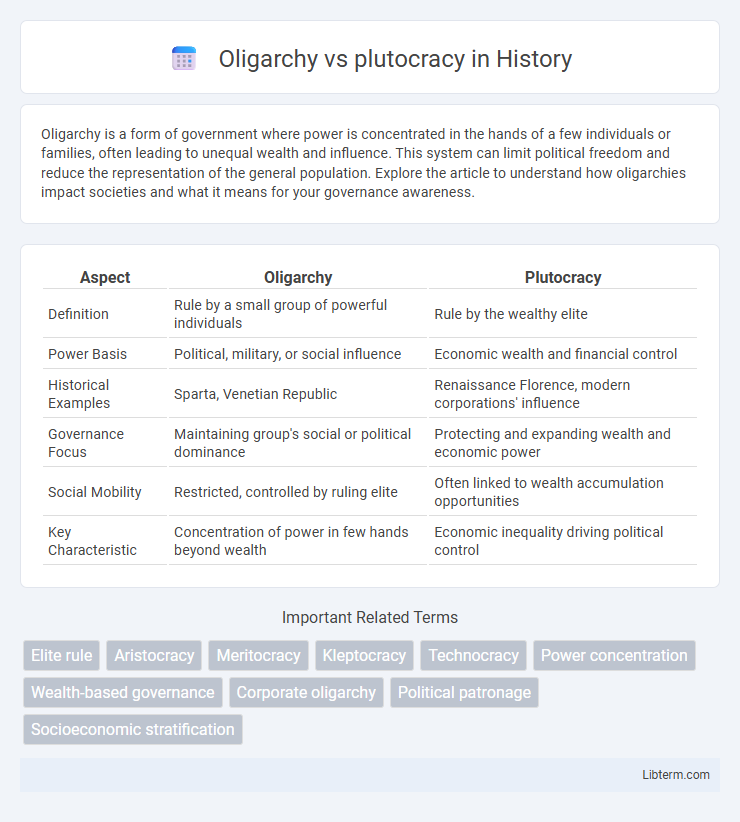Oligarchy is a form of government where power is concentrated in the hands of a few individuals or families, often leading to unequal wealth and influence. This system can limit political freedom and reduce the representation of the general population. Explore the article to understand how oligarchies impact societies and what it means for your governance awareness.
Table of Comparison
| Aspect | Oligarchy | Plutocracy |
|---|---|---|
| Definition | Rule by a small group of powerful individuals | Rule by the wealthy elite |
| Power Basis | Political, military, or social influence | Economic wealth and financial control |
| Historical Examples | Sparta, Venetian Republic | Renaissance Florence, modern corporations' influence |
| Governance Focus | Maintaining group's social or political dominance | Protecting and expanding wealth and economic power |
| Social Mobility | Restricted, controlled by ruling elite | Often linked to wealth accumulation opportunities |
| Key Characteristic | Concentration of power in few hands beyond wealth | Economic inequality driving political control |
Understanding Oligarchy: Definition and Key Features
Oligarchy is a form of governance where power is concentrated in the hands of a small group distinguished by wealth, family ties, corporate interests, or military control. This elite group exercises significant influence over political decisions, often prioritizing their own interests over the broader population. Key features include restricted political participation, centralized authority, and limited transparency, distinguishing oligarchy from other power structures such as plutocracy, which is specifically ruled by the wealthy.
What is Plutocracy? Core Characteristics Explained
Plutocracy is a form of governance where power is concentrated in the hands of the wealthy elite, influencing political decisions and policies to protect their financial interests. Core characteristics include economic dominance, political influence through wealth, and limited accessibility of power to the broader population. Unlike oligarchy, which centers power among a few individuals or families regardless of wealth, plutocracy specifically emphasizes wealth as the primary source of authority and control.
Historical Origins: Oligarchy Through the Ages
Oligarchy, originating in ancient Greece, describes governance by a small, elite group often based on aristocracy or wealth, exemplified by the city-states of Sparta and Corinth. This system prioritized control by landowners or noble families, concentrating political power and limiting broader participation. Over centuries, oligarchies evolved in diverse societies, contrasting with plutocracy where wealth alone drives political influence, highlighting different historical dynamics of elite rule.
The Rise of Plutocracy in Modern Societies
The rise of plutocracy in modern societies is marked by the increasing concentration of wealth and power in the hands of a few elite individuals or families, surpassing traditional oligarchies that rely on hereditary or political control. Wealth accumulation through global finance, corporate monopolies, and technological innovation creates a governance model where economic influence directly shapes policy decisions and regulatory frameworks. This shift challenges democratic principles by privileging financial capital over broader public interest, leading to growing social inequality and political disenfranchisement.
Comparing Power Structures: Oligarchy vs Plutocracy
Oligarchy concentrates power in the hands of a small group of individuals or families, often based on military, political, or social status, while plutocracy specifically vests control in the wealthy elite, emphasizing economic dominance. In an oligarchy, influence may stem from inheritance, military strength, or political connections, whereas plutocracy links power directly to wealth accumulation and economic resources. Both systems restrict broad democratic participation, but plutocracy's governance prioritizes financial capital as the primary source of authority.
Economic Influence in Oligarchies and Plutocracies
Economic influence in oligarchies manifests through the concentration of wealth among a small, powerful elite who use their financial resources to control political decisions and shape economic policies to protect their interests. In plutocracies, the governing power explicitly rests with the richest individuals, whose wealth directly translates into political authority, allowing them to prioritize economic agendas that reinforce their wealth and limit broader economic equality. Both systems result in economic disparities, but plutocracies uniquely formalize wealth as the primary criterion for political power.
Political Decision-Making: Who Holds the Power?
Political decision-making in an oligarchy is controlled by a small group of individuals, often based on family ties, military influence, or social status, who collectively shape policies to maintain their authority. In contrast, a plutocracy concentrates power in the hands of the wealthiest individuals or families, with economic resources directly influencing legislative and executive decisions. Both systems limit broader democratic participation by centralizing control within a select elite, but the basis of power differs between social standing in oligarchies and financial dominance in plutocracies.
Real-World Examples of Oligarchies and Plutocracies
Russia exemplifies an oligarchy where a small group of political elites, including former KGB officials, control key government decisions and economic resources. In contrast, the United States demonstrates elements of plutocracy, with significant influence wielded by wealthy individuals and corporations through campaign financing and lobbying efforts. Other examples include South Africa's apartheid-era regime as an oligarchy and modern-day Saudi Arabia as a plutocracy controlled by affluent royal families.
Social and Ethical Implications of Each System
Oligarchy concentrates power in the hands of a few, often leading to social stratification and reduced political participation, which can exacerbate inequality and social unrest. Plutocracy, where wealth dictates control, intensifies economic disparities and fosters policies favoring the rich, resulting in ethical concerns about fairness and justice. Both systems risk undermining democratic principles by prioritizing elite interests over broader societal welfare, raising critical debates on social equity and ethical governance.
Prospects for Democracy: Overcoming Oligarchic and Plutocratic Rule
Democratic prospects depend on dismantling the concentration of power characteristic of oligarchy and plutocracy, where a few elites or wealthy individuals control political and economic resources. Strengthening transparent institutions, promoting inclusive political participation, and implementing campaign finance reforms can reduce the disproportionate influence of elites and foster more equitable governance. Empowering civil society and ensuring checks and balances are essential for overcoming entrenched oligarchic and plutocratic dominance to realize genuine democratic accountability.
Oligarchy Infographic

 libterm.com
libterm.com